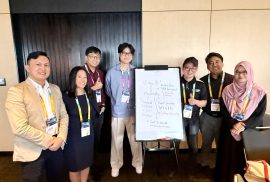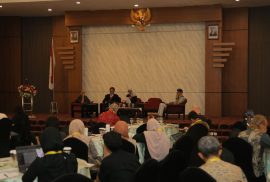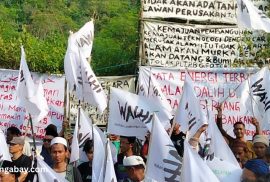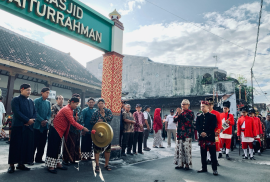The Doctoral Program in Inter-Religious Studies (IRS), Graduate School of Universitas Gadjah Mada (UGM), demonstrated its active participation in the prestigious international forum, The International Conference on Cohesive Societies (ICCS) 2025. The conference was organized by the S. Rajaratnam School of International Studies, Nanyang Technological University (NTU), and held at the Fairmont Ballroom, Raffles City, Singapore, from June 24 to 26, 2025.
2025
Fuji Riang Prastowo
A parallel session at the Unconference on Polarization and Its Discontents in the Global South, titled “A Discussion Forum on Digital Inclusion and Its Connection to Friction and Polarization in the Digital Landscape,” moved beyond academic discourse. It became a dynamic space where indigenous faith practitioners, scholars, and activists confronted one of the digital age’s core tensions: how to foster inclusion without erasing diverse knowledge systems.
The session revealed a pressing truth: digital inclusion is not merely a neutral endeavor aimed at closing gaps; it actively transforms traditional knowledge systems, reconfigures community delineations, and, if approached without critical scrutiny, threatens to exacerbate socio-religious divisions. Technology emerged not solely as an instrument, but as a catalyst for transformation—a pharmakon, embodying both the promise of healing and the threat of toxicity—for indigenous epistemologies.
Anthon Jason
Humans are creatures that live between the mountains and the sea. However, humans are not the only inhabitants of this liminal space. Between the mountains and the sea, humans live by absorbing, taking, and often destroying what is above and below the landscape. Not all humans, but always humans. By exploring who, why, and how life between mountains and seas is changing, we are invited to learn to collaborate with humans and non-humans for future generations, regardless of religious or cultural backgrounds.
Muhammad Rhaka Katresna
In June 2025, an extraordinary event unfolded simultaneously in Yogyakarta, Indonesia, and Utrecht, Netherlands: the NICMCR Pokja’s Joint Research Kick-Off Programme. Under the evocative theme, “Decolonising Knowledge: Rethinking Research in Gender, Ecology, and Education,” this gathering marked the beginning of a crucial three-year joint research project. It was not just an academic meeting, but a deliberate act of bridge-building. Its dual purpose was to critique Eurocentric academic paradigms and to begin a creative, restorative effort to reclaim diverse, local knowledge traditions. The core aim was to collaboratively reframe research by foregrounding local epistemologies, supporting participatory approaches, and challenging the deep-seated colonial legacies in academia.
Rezza Prasetyo Setiawan
On 24–25 April 2025, ICRS organized an unconference titled “Polarization and Its Discontent in the Global South: Mitigation Measures, Strategies, and Policies.” The “unconference” format prioritizes free-flowing conversations instead of structured presentations, which exemplifies a decolonial shift toward reconfiguring colonial logic embedded within academic institutions. This article argues that an unconference setting provides a critique against academic elitism by decentralizing authority and fostering plural bodies of knowledge. The article highlights how the unconference setting contrasts the conventional conference in a collaborative effort toward the decolonization of Global South academia.
Anthon jason
“Det, it is better for me to die fighting against geothermal, than to die because of the impact of geothermal.” Eme’s words in the film “Di Bawah Bayang-Bayang Mata Bor”
struck at the core of our humanity for all who watched the film. The screening was conducted at a parallel session of the Unconference entitled Polarization and Its Discontent in the Global South on April 24, 2025. The 32-minute film was produced by Terracota Films, Perhimpunan Bantuan Hukum dan Hak Asasi Manusia Indonesia (PBHI) Jawa Barat, and BandungBergerak.
Imanuel Geovasky
In a global society that is growing more and more characterized by disintegration, a problem of grave international concern is the persistent concentration of polarization (Carothers & O’Donohue 2019, Dilmaghani 2020, McCoy et al. 2022). This global trend is also reproduced at the national level, where many acts of intolerance continue to enlarge cleavages. Against such a rough backdrop, one question lies at the bottom: is it possible that depolarization, the reduction or reversal of social cleavage, may originate from the bottom, from the “below”? This question challenges whether or not communities can mend ideological and social divides themselves, rather than relying on top-down measures.
Afkar Aristoteles
In today’s polarized world, gender issues are an important topic of discussion because they are related to building a just society. However, various experts have highlighted that efforts that should support gender equality are often based on biased perspectives and misrecognized.
The topic of gender justice and polarization became a discussion cluster at the Unconference: “Polarization and Its Discontents in the Global South: Mitigation Measures, Strategies, and Policies”. This activity was organized by the Indonesian Consortium for Religious Studies (ICRS) Yogyakarta by presenting communities, academics, and activists from local to international levels at the University Club (UC) UGM, April 25-26, 2025.
Fuji Riang Prastowo
The Indonesian Consortium for Religious Studies (ICRS) has once more exhibited its intellectual and ethical leadership by facilitating critical worldwide discussions at the nexus of faith, politics, and technology. During the recent unconference titled “Polarization and its Discontents in the Global South,” conducted in Yogyakarta on April 24-25, 2025, the second plenary session—“Digital Polarization and Inclusion among Indigenous Religious Communities”—transcended traditional academic dialogue. It provided not only essential insights but also fervent calls for fundamental reform in the conceptualization and implementation of digital inclusion.
Hanny Nadhirah
“Who gets to define Pancasila? Or more bluntly, siapa sih yang paling Pancasilais (who is the most Pancasilaist)? This question reminds us of Indonesia’s long history of monopolizing the interpretation of Pancasila, particularly under the Suharto regime, when it became an instrument of political control. Suharto’s famous claim, “Those who criticize me criticize Pancasila,” set the tone for silencing dissent and narrowing the space for diverse interpretations.
In response to this legacy and to reopen the conversation, a documentary film entitled “Pancasila is Me” was launched at the Unconference on Polarization and its Discontent in the Global South hosted by the Indonesian Consortium of Religious Studies (ICRS). Rather than offering a normative account of Pancasila’s importance of history, the film invites audiences to explore the multiple paradoxes that continue to shape its meaning in Indonesia’s evolving journey.










